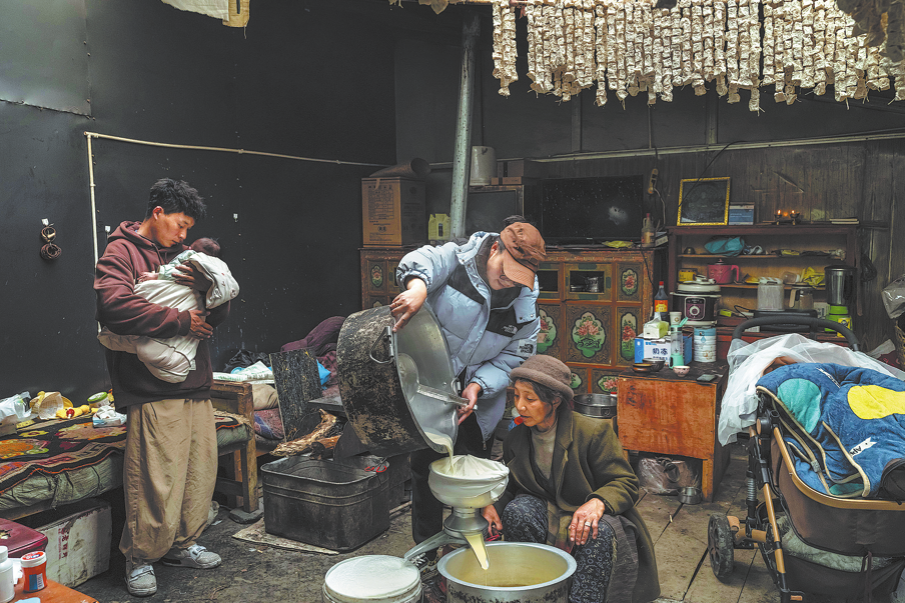A career that's a cut above
NPC deputy from Southwest China gives ethnic clothing a modern look, report Yang Feiyue and Yang Jun in Guizhou.

Li Li returned to her ethnic costume-making business with a renewed passion after her trip to Beijing for the two sessions in March.
"This year's government work report has proposed enrichment of the spiritual and cultural life of the people, promotion of excellent traditional Chinese culture, strengthening the protection and inheritance of cultural relics and cultural heritage, as well as support of the development of cultural industries," says Li, from Zitang village, Qinglong county, Qianxinan Bouyei and Miao autonomous prefecture, Southwest China's Guizhou province.
"It has given me great hope and expectations for the future," Li says, adding that what she has been doing is in line with the stipulations of the report.
Li, in her 30s, attended the two sessions as a deputy to the National People's Congress.
Love of her indigenous Bouyei culture has seen her launch a successful costume business, which has not only helped spread the charm of local ethnic culture but offered employment opportunities to many local women.
"In addition to Bouyei, Qinglong county is home to many other ethnic groups, such as Yao and Yi people," Li says.
She has kept a special eye on popular colors, styles or other elements while making Bouyei clothes, because "once those rich local ethnic elements are added, the clothes will become exotic yet fashionable wear, suitable for modern occasions", Li says.
Her efforts have managed to increase sales.
"Some of our ethnic costumes have been hotly sought-after, especially during livestream sales," she says.
Since the beginning of this year, she has been snowed under with orders for her clothes.
"March orders were three times compared with those of the same period last year," Li says.
The rising demand for ethnic costumes has made her determined to teach more local women embroidering and other costume-making skills. "Hopefully, they can open up their own businesses, which will lead to more job opportunities for locals," Li says.
Her care for the locals' lives was also one of the reasons that she got elected to represent her people to join the Beijing event.
Li wore two ethnic costumes she made specifically for the two sessions. "I wanted to wear my home costumes to the two sessions," she says.
During her stay in Beijing, Li proposed several suggestions, including stepping up follow-up support measures for the relocation of poverty alleviation sites in ethnic minority areas.
As old Bouyei tradition goes, when choosing a son-in-law, look at his ability to plow the fields, while when choosing a wife, look at her ability to weave. Growing up in such an environment, Li, like other local girls, has been exposed to how traditional clothes were made from a very young age.
"I have been learning sewing, fabric dyeing, embroidery and other handicrafts from my mother since I was a child," Li recalls. "And I dreamed of having a set of our Bouyei ethnic costumes. It wasn't until I saw the clothes I made myself that I realized how fulfilling it was."
That moment planted the seeds of her dream of pursuing a career as a tailor.
At the age of 18, Li left home for Guangdong province to make a living and help support her family.
She thus embarked on a nine-year journey that took her from a garment factory to a handbag workshop and eventually into sales positions. In the interim, she honed her sewing, cutting and design skills. Her experience in sales taught her the art of persuasion and the value of building relationships with customers. She then found an entrepreneurial spirit emerging in her.
"Growing up in the culture of the ethnic Bouyei group, I deeply love my origins and have always wanted to promote the culture of my people and make it known to the world," she says.
This urge grew stronger after she worked outside her home village for a long time. "You would feel a lack of sense of belonging and miss everything from your hometown," Li says.
Her increasing knowledge and experience sharpened her belief that the intangible cultural heritage of her home should not be left behind. Therefore, Li quit her job and returned to the mountains of Guizhou. In 2016, Li started up her own business, Bouyei Yao Cultural Development Co in Xingyi, a county-level city in the southwest of the prefecture.
She started to produce a series of ethnic cultural and creative products, including hand-woven bags, clothing, scarves, bedding, and small items. She made a point of incorporating Bouyei ethnic elements into daily necessities, as well as creative cultural products, which gave the traditional weaving techniques a new charm.
Those distinctive ethnic products got positive market feedback and were then sold in Beijing and Shanghai metropolises, as well as Zhejiang, Guangdong and Fujian provinces.
In the Bouyei language, the company's name Bouyei Yao means "we are Bouyei people". Li says she hopes her business can "elevate ethnic cultural creativity to a new level through hard work, and let the ethnic brand go global".
As her business grew, Li increasingly realized that the key to retaining good craftsmanship lies with traditional craftsmen.
Making ethnic clothes involves intricate yet delicate handicraft, from yarn spinning to thread arrangement and weaving.
Besides technique, a profound culture exists behind the costumes.
Wang Jing, a Bouyei costume craftswoman, says that generally speaking, flowers, birds, fish and insects are the major symbols on Bouyei costumes. "They all originated from nature and have been artistically processed to evolve into the patterns we see today," Wang says.
Ethnic costume styles vary with the local environment. "For example, aquatic animals like fish and shrimp have emerged more in embroideries near the Nanpan River, while those originating in mountainous areas feature flowers, grass, bamboo and banana leaves," Wang explains.
Li believes it is the cultural inheritance from generation to generation that makes ethnic craftsmanship unique and charming.
To breathe new life into her products and ensure better and more sustainable development of traditional ethnic costumes, Li took the plunge and moved her company to Zitang village in 2019, with the aim of bringing together local experienced ethnic costume makers.
"With the help of my family at home, we gathered nearby embroidery artists to work in the company, allowing them to leverage their expertise to pass on ethnic handicrafts while increasing their income by working from home," Li says.
Although the transportation and logistics are a bit inconvenient, Li considers this a small price to pay.
In June 2020, her cause won support from the local authorities, who assigned her a 400-square-meter plant with a favorable rent.
The addition of the experienced costume makers has helped bring more ethnic elements to the products. Li has also ensured that her products keep up with the times. "Although the embroidery products from my hometown are exquisite, we need to become 'fashionable' embroiderers to stay in line with market demand," Li says.
"Therefore, on the basis of preserving our ethnic traditions, we have conducted research and improvements on existing clothing and creative cultural products, so they can be more diverse, of better quality and with distinctive features," she says.
She has also built a livestream team and begun to sell products through various online platforms, with the highest daily sales reaching 20,000 yuan ($2,907) a day.
Now, her products enjoy brisk sales across the country. The booming business has also enabled Li to better respond to local authorities' efforts to boost villagers' incomes over the past three years. She has taken the initiative to arrange vocational training at local communities as well.
Her business has offered job opportunities to about 200 people, each of whom receives an extra income of 28,000 yuan per year.
Last year, Li took the lead in developing an ethnic intangible cultural street that features costume exhibitions, intangible cultural heritage handicraft training, production and livestream experiences.
Her promotion of local natural scenery, ethnic culture and creative products on online platforms such as Douyin has helped her draw a fan base of more than 100,000 people.
"Next, I will rely on the ethnic intangible cultural heritage sector to vigorously explore the integration of multiethnic culture and create more creative cultural products and mature production lines," Li says, adding that the goal is to connect the production line and the market and have ethnic embroidery highlight the local tourism industry.


Today's Top News
- APEC Symposium and Informal Senior Officials' Meeting held in Shenzhen
- World Bank raises China 2025 growth forecast
- Turning export resilience into prosperity
- Policy paper on Latin America and Caribbean unveiled
- IMF: China's resilience will be sustained
- Optimization of educational assets stressed






























